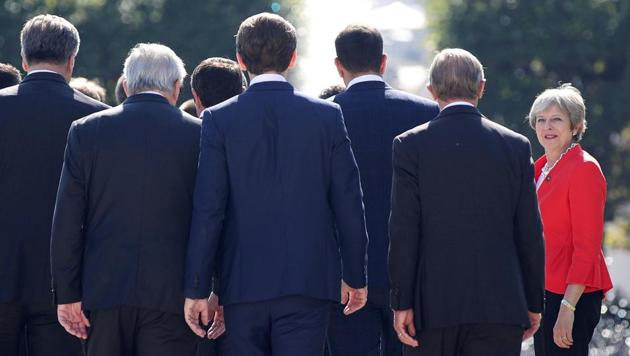Brexit: EU rebuff throws Theresay May’s plan into disarray
Britain PM Theresa May was greeted with bruising headlines in the press on Friday, describing her Salzburg trip as a “humiliation” and “disaster” .
Held up as the only option on the table, Prime Minister Theresa May’s Chequers plan to leave the EU was rejected by European leaders in Salzburg, leaving her politically weaker on Friday to face critics at the annual Conservative Party conference on September 31.

Amid high-profile resignations and criticism since the plan was unveiled in July at Chequers, the prime minister’s country residence, May has insisted it alone is capable of honouring the 2016 referendum vote to leave the 28-nation bloc, due on March 29, 2019.
May was greeted with bruising headlines in the British and European press on Friday, describing her Salzburg trip as a “humiliation” and “disaster” and saying that she was “sent packing”, after European Union leaders described her plan as “unworkable”. Worse, France President Emmanuel Macron called pro-Brexit leaders “liars”, riling many in the UK.
Admitting negotiations had reached an impasse, May stuck to her stand in a televised statement from Downing Street, seeking to put the ball back in EU’s court: “At this late stage in the negotiations, it is not acceptable to simply reject the other side’s proposals without a detailed explanation and counter proposals.
“So we now need to hear from the EU what the real issues are and what their alternative is so that we can discuss them. Until we do, we cannot make progress.”
The oft-repeated criticism in Westminster on Friday was that May was in denial, after she and her allies stuck to the line that the Chequers plan envisaging continued links (“common rulebook”) with the EU after Brexit was “still workable”.
Another major hurdle has been May’s plan to avoid a hard border after Brexit between Ireland (a EU country) and Northern Ireland (part of the UK). The two are closely linked by culture, history, politics, economy and the long period of conflict.
Leaving the EU means leaving the single market and the customs union, which implies new border arrangements between the UK and the only EU country with which it will share a border: Ireland. In short, the reality of geography poses a major challenge to Brexit plans.
Communities secretary James Brokenshire sought to defend May’s approach: "The Chequers deal is a workable, credible deal to meet our ambitions. They (the EU) have said that it's about the integrity of the single market and we believe the Chequers deal responds to that, and it's for the EU to engage with what's on the table."
However, Scotland's first minister Nicola Sturgeon tweeted: "Now that the EU has explicitly rejected it, the Chequers pretence has to stop. At the very least, single market/customs union membership must be back on the table and the Article 50 clock must be stopped to avoid a cliff edge."
Shadow Brexit secretary Keir Starmer told BBC that if the negotiations ended without a deal, it "would be catastrophic for our economy, plunging it into real crisis. Really, the next few weeks should be all about how does the prime minister avoid that.
"She needs to accept that we need a customs union and a strong single market deal, both for the Northern Ireland border and for our economy," he added.






